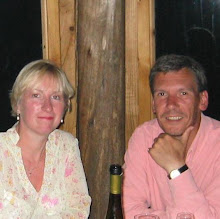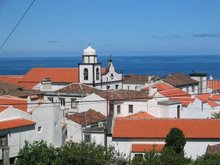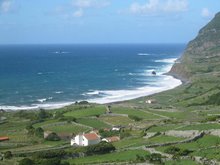
I'm currently involved in a very small way in a translation project in which the Portuguese word pisão came up.
I was told it meant a fulling mill. A what-ing mill? I asked. A mill where cloth is fulled came back the delphic reply. What the full is fuc... I was on the point of retorting when a penny began to drop. Fuller is a surname isn't it (not that I can think of anyone who's called it right now) so it wasn't totally alien to me.
Dived in to Wikipedia to discover that fulling is the process of finishing raw woollen cloth by - well - kind of yanking and flapping it around a bit. Apparently this has been done since the Assyrian Empire in water powered fulling mills - pisãos as I now know them to be called in Portugal - but it can also be done by hand. This must be the thing you see sturdy looking lasses in the Outer Hebrides doing to bolts of Harris Tweed round a table while singing dirgy Gaelic chants which sound like "Hoo-ruh Huh-rah Hoo-huh" in these grainy old black and white archive films. For reasons I didn't quite grasp from the Wikipedia article, urine is important to the process of fulling to the point where the Romans imposed a tax on it (and if anyone comments with any smart remarks about the origins of spending a penny, then I'm taking the opportunity to knock that on the head right now).
Anyway, I digress, because the interesting fact which I didn't know before and wanted to share with you is this:- Fulling is also known as walking (waulking in Scotland) or tucking and - here it comes - this is the origin of the surnames Walker and Tucker.
Isn't that interesting? So the chap on the bottles of Scotch setting a brisk pace can slow down a bit: he no longer has a reputation to live up to.
I was told it meant a fulling mill. A what-ing mill? I asked. A mill where cloth is fulled came back the delphic reply. What the full is fuc... I was on the point of retorting when a penny began to drop. Fuller is a surname isn't it (not that I can think of anyone who's called it right now) so it wasn't totally alien to me.
Dived in to Wikipedia to discover that fulling is the process of finishing raw woollen cloth by - well - kind of yanking and flapping it around a bit. Apparently this has been done since the Assyrian Empire in water powered fulling mills - pisãos as I now know them to be called in Portugal - but it can also be done by hand. This must be the thing you see sturdy looking lasses in the Outer Hebrides doing to bolts of Harris Tweed round a table while singing dirgy Gaelic chants which sound like "Hoo-ruh Huh-rah Hoo-huh" in these grainy old black and white archive films. For reasons I didn't quite grasp from the Wikipedia article, urine is important to the process of fulling to the point where the Romans imposed a tax on it (and if anyone comments with any smart remarks about the origins of spending a penny, then I'm taking the opportunity to knock that on the head right now).
Anyway, I digress, because the interesting fact which I didn't know before and wanted to share with you is this:- Fulling is also known as walking (waulking in Scotland) or tucking and - here it comes - this is the origin of the surnames Walker and Tucker.
Isn't that interesting? So the chap on the bottles of Scotch setting a brisk pace can slow down a bit: he no longer has a reputation to live up to.




1 comment:
I believe the boiled wool used in Geiger of Austria's clothing can also be considered fulled. Not that I can easily afford their garments, but I've seen them in store windows and in magazine ads.
Post a Comment